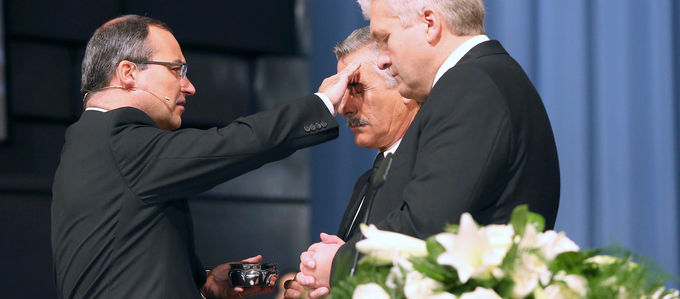
It has been called the structural law of biblical salvation history: the principle of substitution. Even the New Apostolic Church’s understanding of salvation for the departed is founded upon this. Following is the story of where the fundamental model originates—and where it ultimately leads.
The Catechism acknowledges three sacraments for the departed: Holy Baptism, Holy Sealing, and Holy Communion. “These sacraments are likewise administered to two ministers on behalf of the departed,” it says in section 12.1.9.
This principle also appears with respect to the baptism for the dead referenced in 1 Corinthians 15: 29: “Exactly how one is to conceive of vicarious baptism in terms of its theological construction is an interesting question,” writes the well-known New Testament scholar Klaus Berger. “The basic idea is that of substitution.” And: “The aim of every substitution is to confer salvific credit upon those who are not actually performing the act.”
One idea, many words
While the Bible does not contain a specific word that can be translated as “substitutionary” or “vicarious”, the concept is definitely present and is also found in the language. For example, the list of alternative words in Old Testament Hebrew includes: “stand before God”, “stand in the breach”, “give a ransom”, “bear”, or “take away” sin, “make intercession”, “on [someone’s] behalf”, and the like.
In more concrete terms: the patriarch Jacob represents the entire people of Israel. Abraham stands before God and advocates for the people of Sodom. And Moses mediates in both directions at once: on the one hand, he delivers the Ten Commandments as a messenger of God. But as an intercessor for the people, he implores God for mercy on behalf of those who danced around the golden calf.
More than just a placeholder
Here the term substitution most often means: “for the benefit of”. However, this often changes to “in place of”, for example when the book of Lamentations bemoans the fact that the descendants must bear their fathers’ guilt. Or when the scapegoat is made to shoulder the misery of others.
The hymn of the Suffering Servant in Isaiah—in which a righteous individual intercedes for guilty parties by bearing the consequences of their sins—constitutes the acme of this way of thinking. The Old Testament never fulfils this requirement. It is only fulfilled in Jesus Christ.
On the next level
This is how the New Testament understands salvation, namely that Jesus Christ died and rose again “for me”, “for us”, “for you”, “for many”, “for all”, “for the wicked”, “for one’s brother”, “for the benefit of”, “in favour of”, “in place of”, “instead of”, or “for the sake of”. The good shepherd dies for the sheep, and the friend dies for his friends.
And the principle of substitution does not stop there: the messengers of Christ can heal by His authority. But even sincere intercession can achieve a great deal. The Holy Spirit works in individuals for the benefit of many. And incorporation into the body of Christ means dying with Christ and being raised up again in Christ.
Each of us is a substitute
Substitution, the theologians conclude, means that the actions of individuals become the point of entry for God’s salvific presence in the world. And what’s more: anyone who supports others within the scope of his or her talent and calling likewise becomes a point of entry for salvation.
The famous Protestant theologian Dietrich Bonhoeffer speaks of substitution as the life principle of the church. And his Catholic colleague Karl-Heinz Menke says: “This is what constitutes the new covenant, namely the fact that every Christian in some way becomes a substitute through, with, and in Christ.”
Living the principle
The principle is practised very differently depending on the denomination. Sometimes the priest prays on behalf of the whole congregation. At other times an ordained pastor might slip into the role of Jesus Christ at the Lord’s Supper. And on occasion parents or godparents profess belief in the Redeemer on behalf of the child being baptised.
And the New Apostolic Church professes belief in God’s universal will to save in that the substitution of the entire congregation of God is not only of benefit in this world but also in the beyond.
Photo: Ju_see – stock.adobe.com













